Islamic Republic Denies Medical Care To Political Inmates
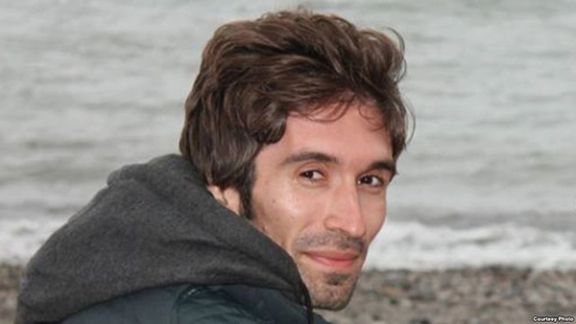
Reports say the health condition of two detained Iranian activists is deteriorating as the Iranian regime denies proper medical care to them.

Reports say the health condition of two detained Iranian activists is deteriorating as the Iranian regime denies proper medical care to them.
Arash Sadeghi, 36, is one of these inmates, whose father on Tuesday warned about his physical condition, saying he was arrested despite suffering from bone cancer and does not have access to medicine and treatment.
In a video published on social media, Hossein Sadeghi also pointed out that “if Arash is not treated for two months, he will not survive.”
“After the start of nationwide protests in Iran, Arash answer my calls, but later on a short call he announced he was arrested and was in ward 209 of Evin Prison which belongs to the intelligence ministry,” added the father.
Reports say Yashar Tahidi, a political prisoner, who was injured by several bullets last month following the disturbances at Evin prison, is denied proper medical care despite his deteriorating physical condition.
According to HRANA News Agency, Yashar is also suffering from “attention deficit disorder” and needs regular medication, but this is not given to him due to shortages.
Yashar Tohidi has been serving his sentence of 2 years and 9 months in Evin prison since June 7, 2022.
The health condition of the well-known political prisoner Hossein Ronaghi is also worsening. His brother Hassan said in a tweet Tuesday that he is in Evin Prison's infirmary on a dry food strike and has not received any treatment yet.
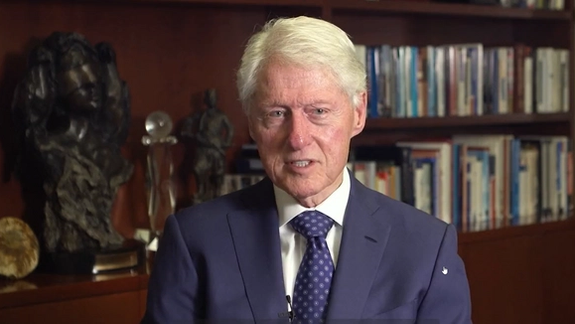
Former US President Bill Clinton has strongly condemned the repression of peaceful protesters by the Iranian regime saying that they must stop abducting and imprisoning demonstrators.
In a video message on Tuesday, he expressed solidarity with Iranians, saying he joins the international calls for the Islamic Republic to immediately stop the abduction of protesters and to release all political prisoners, many of whom require urgent care.
“I've been in awe of the courage the Iranian people have shown, particularly the brave women and girls as they fight for their freedom. The Iranian people's fight is about more than a headscarf. It’s a fight for basic rights: the right to speak, assemble freely, appear unveiled, to realize their dreams... for themselves and their children. The right to a future they can chart,” added the former president.
Addressing the Iranian nation, Clinton noted the world is witnessing their courage adding, “we will stand with you for as long as it takes to achieve your freedom.”
He also addressed the international community, stressing that “the Iranian people need us. They want to be part of our global community.”
Calling Iranians “educated, highly industrious, creative, and sophisticated,” he said they want normal relations with the West, so they deserve to be supported.
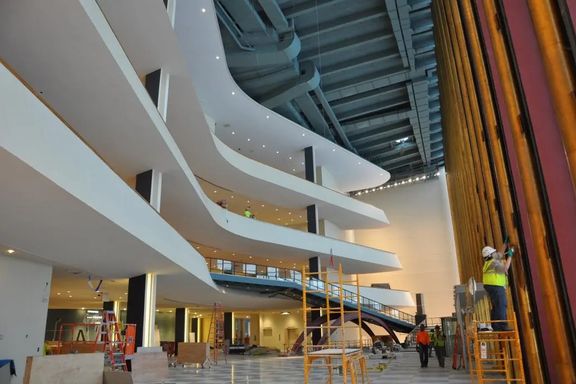
Iran International’s correspondent was asked to leave a meeting at the UN headquarters in New York attended by two visiting Islamic Republic officials who apparently were justifying Tehran’s clampdown on protesters.
Amid the global outcry over the Islamic Republic human rights violations, which is also condemned by numerous UN officials, organizers of the meeting made our correspondent Maryam Rahmati and BBC Persian’s Bahman Kalbasi leave the session on the pretext the meeting was held behind closed doors while Iran's state broadcaster was allowed to cover the event.
The event at the UN building was a meeting of the Organization of Islamic Cooperation (OIC). The OIC has permanent delegations to the United Nations and the European Union. The meeting paused and only resumed after all the reporters left the room.
The Iranian officials present at the meeting were Kazem Gharibabadi, the deputy head of the Judiciary who is also secretary of the High Council for Human Rights, and Zohreh Elahian, a member of parliament's National Security and Foreign Policy Committee. Elahian reportedly was one of 227 lawmakers in Iran who recently signed a letter requesting the execution of some protesters.
“Why is your government so scared of us?” asked our correspondent before leaving the room. “If you are not doing anything wrong; if you are not killing the people of Iran, why are you scared of our media outlet?” she said.
She went on to ask Gharibabadi what was wrong with covering the meeting, as he was sitting smugly with a sober face.
The meeting in question was organized at the behest of the Islamic Republic seemingly to provide an opportunity for the regime in Tehran to justify the death sentence that authorities seek for some protesters, or blaming the media for the unrest in the country as they always do.
Later on Monday, Iran’s state media cited Gharibabadi as saying on the sidelines of the meeting that the British government’s support for the “unlawful anti-Iran campaign waged by the Persian-language media outlets” is the root cause of the popular protests that has been going on for the past two months.
Unable to come up with a working proven allegations against Persian-language media outlets, the Islamic Republic has launched a smear campaign against UK-based channels, describing them as terrorist groups.
“In fact, the anti-Iran Persian-language media’s moves are completely contrary to the laws and regulations, and we hold the British government responsible in this regard,” Gharibabadi told reporters in New York.
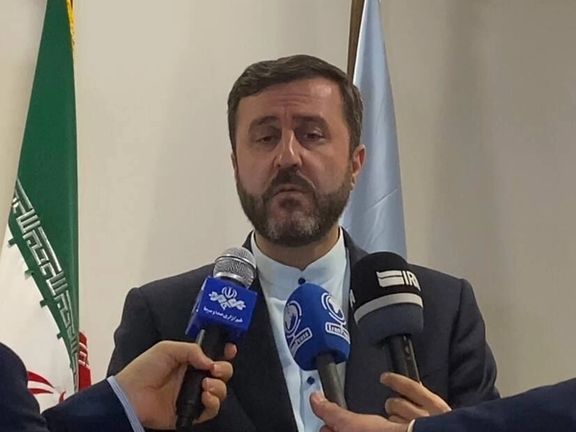
As Western countries seek to ratchet up scrutiny of Tehran’s human rights violations, the UN human rights office called on Iran's government to immediately release thousands of detained protesters, faulting its “increasing harshness”.
At a UN press briefing in Geneva on Tuesday, Spokesman Jeremy Laurence of the office of the UN High Commissioner for Human Rights said it was calling for all charges to be dropped against the demonstrators and cautioned that Iran can only mete out the death penalty for the “most serious crimes" under international law.
“Instead of opening space for dialogue on legitimate grievances, the authorities are responding to unprecedented protests with increasing harshness,” he said.
The UN Human Rights Council plans to hold a special session -- slated for 24 November -- to address “the deteriorating human rights situation.” The special session is being convened following an official request submitted on November 11 by Germany and Iceland, which has been supported by 44 States thus far.
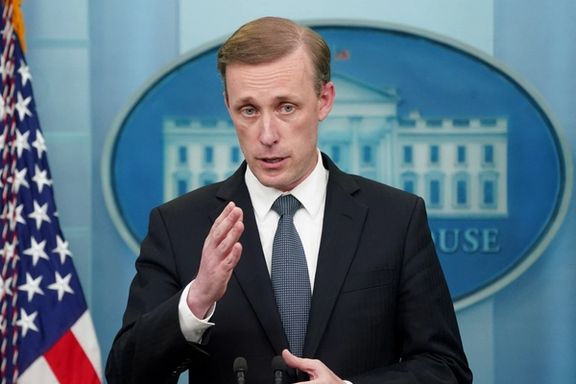
The United States reiterated concerns Monday over Islamic Republic’s crackdown on dissent as well as systematic denial of basic dignity and freedom of Iranians.
In a statement by National Security Advisor Jake Sullivan, the White House expressed deep concerns about Islamic Republic’s mass arrests, sham trials, and the impending death sentence for protesters voicing legitimate demands against “a government that systematically denies basic dignity and freedom to its people.”
“The eyes of the world are on Iran,” he said, stressing that “The human rights abuses inflicted by its government must not go without consequence.”
He also welcomed new set of sanctions by the European Union and the UK over its bloody crackdown on protests, underway since the death in custody of 22-year-old Mahsa Amini mid-September, saying that the United States, standing with our partners and allies around the world, staunchly supports Iranian people and their demands. The US will continue to pursue accountability for those responsible for these abuses through sanctions and other means, he added.
Mentioning Iranian dissident blogger Hossein Ronaghi, who was transferred temporarily from Evin prison to hospital after reports of torture, Sullivan said, “The torture and mistreatment of political prisoners like Mr. Ronaghi must cease.”
Tehran residents rushed to a hospital Sunday night as news emerged that Ronaghi had been taken there in a critical condition. Ronaghi who has been on hunger strike since his arrest on September 24, has refused liquid nourishment and water since Saturday.
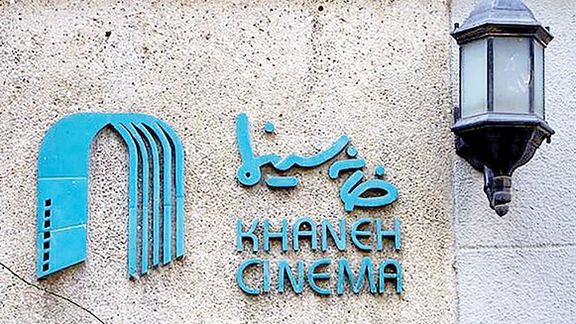
Tens of artists in Iranian cinema, theater, and music industry have been banned from working or leaving the country over their support for antigovernment protests.
In an article published by reformist Shargh daily on Monday, Iran’s House of Cinema, formerly known as the Iranian Alliance of Motion Picture Guilds, said it has prepared a list of 100 filmmakers as well as other movie, music and theater personalities who have been either arrested or banned from work.
The paper said the list was made in collaboration with Iran’s Theater Forum and Iran’s Music House but was not released due to safety reasons. However, it said that documentary maker Mozhgan Ilanlou and actress Katayoun Riahi were among those who are currently under arrest, adding that the detained artists are being held in Evin and other prisons around Tehran, as well as in Tabriz and Sanandaj prisons.
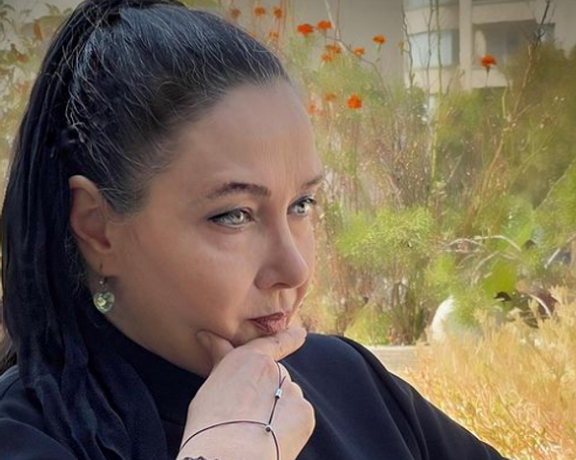
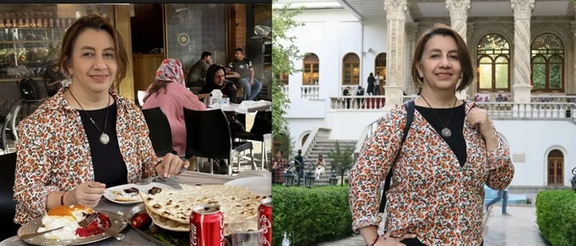
According to Shargh, a 10-member taskforce has been set up to keep a list of measures against artists and follow up on their whereabouts. One of its members, Mehdi Kouhian, himself a producer and a legal expert, said that there is no exact data about the number of arrested or banned artists because the authorities do not publicly announce such things. He added that the recent detainees either protested online or took part in street rallies.
According to the article, during the past few months “most famous actors and directors" have been banned from working and some of their contracts were terminated while they were working on projects.
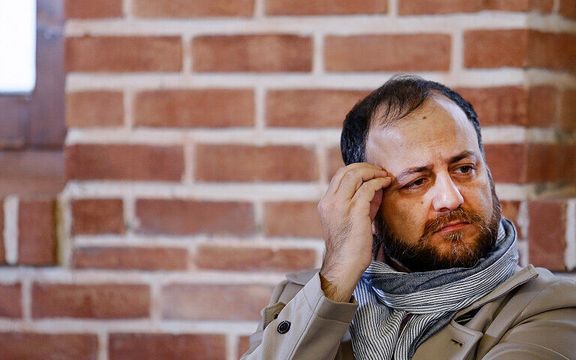
No matter how big the list of banned or arrested artists is, the list of celebrities who are expressing support for the uprising is bigger. Every day, more and more Iranian actresses and athletes are appearing in public or posting photos of themselves without the Islamic Republic’s mandatory hijab as a show of solidarity, while many male artists voice their support verbally or by participating in protest gatherings.

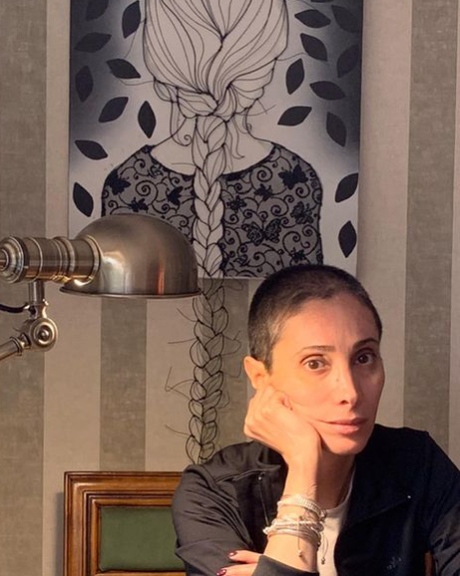
However, Supreme Leader Ali Khamenei, called such acts of support "worthless" in a speech last month and asked the judiciary to deal with them.
Even before the current wave of protests began in mid-September, the Ministry of Culture and Islamic Guidance had started cracking down on filmmakers and artists who were critical of the regime. About a month before the start of protests, Mohammad Khazaei, the head of the Cinema department of the ministry spoke of a list of banned filmmakers and actors for various reasons. In recent decades, such a list has always existed, but it was the first time that a high-ranking official publicly talked about it.
In August, Culture Minister Mohammad Mahdi Esmaili defended banning artists and once again threatened them to stop “working against the national interests" of the Islamic Republic.
On Saturday, imprisoned filmmakers Jafar Panahi and Mohammad Rasoulof issued a statement from Evin Prison warning about serious deterioration of dissident blogger Hossein Ronaghi’s health who was on a hunger strike in the past 50 days before being transferred to hospital on Sunday.
In July, Iran’s judiciary said award-winning film director Jafar Panahi was sent to Evin prison to serve his six-year sentence. Panahi, who has won numerous awards, including the Golden Leopard at Locarno Festival, the Golden Lion in Venice, and the Silver Bear at the Berlinale, was arrested earlier as he was protesting the detention of two other award-winning filmmakers Mohammad Rasoulof and Mostafa Alehahmad.
Rasoulof – another prominent filmmaker with several international awards such as the Golden Bear – and Alehahmad – who is known in international film galas for his short works -- were arrested July 8 as part of the Iranian crackdown on the signatories of a collective statement titled “Lay down the gun” issued by more than 100 film industry personalities at the end of May.
The statement had called on military and security forces who “have become tools for cracking down on the people,” not to suppress protesters during a wave of protests across Iran that were triggered when a 10-story building collapsed in Abadan, leaving at least 40 people dead and dozens missing.
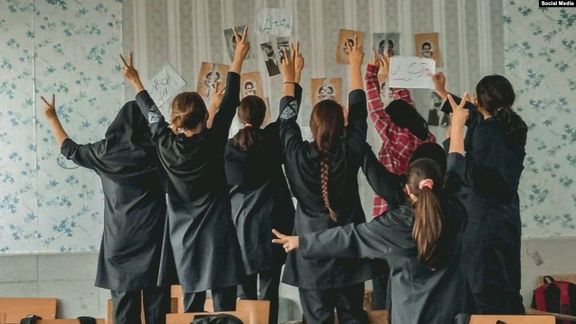
Leading reformist figures in Iran have recently made statements that reveals their interest in preserving the status quo despite popular protests aimed at changing the political system.
In several articles over the past weeks, reformist commentators expressed concern that the situation is going toward a revolution while they claimed the nation wanted only to reform the system and warned that a dramatic change may lead to undesirable uncertainty.
On November 14, two reform figures, former President Mohammad Khatami and former vice president Massoumeh Ebtekar broke their silence after more than 8 weeks about a possible demise of the regime and voiced their opposition to dramatic changes in the Iranian political system.
Khatami, revealed his opposition to regime change by saying that it was "neither possible, nor desirable." Nonetheless, he warned that if the current state of affairs continues, the ground is paved for a looming social collapse.
Khatami called on the regime "to reform itself," but at the same time acknowledged that "a large part of the society shares the protesters' dissatisfaction" of the current political system.
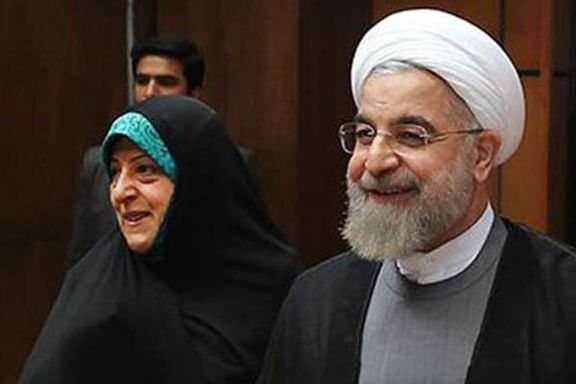
On the same day, Ebtekar said in a commentary in the reformist daily Etemad in Tehran, "The new generation of Iranians believes it is not only the Iranian government, but the entire Iranian political system that is inefficient."
She added, "The Iranian government has been lagging behind the society for several years now. By not recognizing natural social developments, the Iranian government has created the current crisis for itself."
Ebtekar said elsewhere in her commentary: "the Iranian state television and other organizations with hefty government budgets which are responsible for keeping the public informed have failed to listen to young Iranians and their demands." She added that "Unfortunately, many religious and propaganda organizations deny the pluralism that exists in Iranian society and wish to dictate whatever that serves their interests."
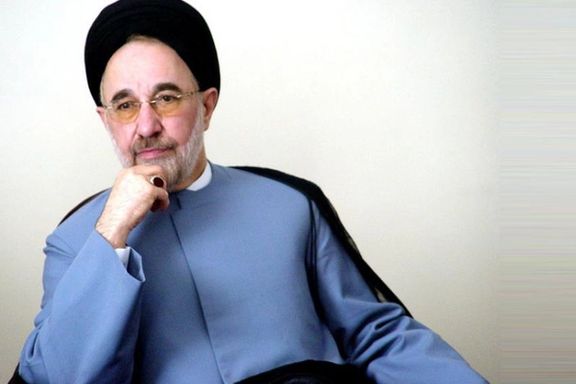
The new generation that has grown up with the Internet and social media, believes to be a citizen of the world and cannot tolerate the traditional guidelines, Ebtekar said, adding that this has created a generational gap in Iran.
In an article carried by Etemad newspaper, Iranian American author and sociologist Asef Bayat wrote in a response to reformist commentator Abbas Abdi who had opposed regime change and expressed concern that the current protests might lead to a tragic end for Iranian society, "The tragedy of reformism in Iran is that Iranian reformists cannot further any reforms because they have been pushed out of the power circle, and at the same time they cannot agree with radical changes in Iran because by definition they are reformers and not revolutionaries."
Bayat wrote that "individuals like Abdi fear the cost of a revolution. They fear violence, instability and damage to the country's infrastructure. Ordinary people are also afraid of the cost of a revolution, but they risk everything when they see that all roads to reform are blocked.
"However, some people talk about the risks involved in a revolution as though the current situation is risk-free like a paradise," Bayat said adding that the costs of the current situation include an average 20 percent inflation, high unemployment particularly among educated Iranians, high recession in the 2010s, the collapse of the middle class and pushing 45 percent of the population under the poverty line, destruction of the country's environment and many of its villages, and the decline of Iranians' status in the world because of the government's adventurist policies.
Bayat argued that Mahsa Amini, the young woman murdered in custody of morality police, the workers in Assalouyeh oil and gas fields and millions of Iranian men and women are being constantly humiliated, losing their hopes and their lives. But those who have chosen not to submit to this gradual death have taken collective action to change the status quo.